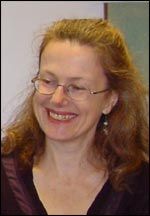Transforming Matter, Refining the Spirit: Alchemy, Music and Experimental Philosophy around 1600
Penelope Gouk
Abstract:
This paper explores the relationship between alchemy, music, and experimental philosophy as it was understood by early modern philosophers who sought to discover the hidden powers of nature and the ultimate principles of matter. In particular it focuses on the beliefs and practices of a small group of alchemists around 1600 who identified themselves with Paracelsus, the German physician who earlier in the sixteenth century had advocated a radical programme of medical and social transformation that coincided with the upheavals of the European Reformation. These Paracelsians conceived their alchemy in profoundly Christian terms and sought to acquire wisdom through revelation by the Holy Spirit (spiritual alchemy), not simply through experiments (material alchemy). A famous engraving of 1595 depicts the theosopher and physician Heinrich Khunrath at work and prayer in his alchemical “laboratory”, a word that he coined to embody this dual process. However, although this image has been used by historians of science to illustrate the overlap between magic, religion and the emerging experimental philosophy, little of substance has been said either about the musical instruments that are prominently displayed in the foreground of this picture, or the inscription below that recommends sacred music as a cure for sadness and a remedy against evil spirits. Starting with the instruments themselves and moving to the harmony that they both create and embody, my paper explains the transformative role that music played in Khunrath’s mental universe. At one level I show how actual music, as embodied sound, was understood to move the spirits that mediated between body and soul, and therefore could be used not only to counteract the melancholic effect of too much study but also to elevate the soul towards the divine. At a more fundamental level I discuss the musical models which were used as a means of conceptualising the activity of the essential spirit inherent in matter that was central to his alchemical practice. Finally, I argue that the Paracelsians’ search for soul medicines was not just about healing individuals but part of the broader alchemical quest to restore harmony to the social body in the face of political and religious fragmentation.
Penelope Gouk
Abstract:
This paper explores the relationship between alchemy, music, and experimental philosophy as it was understood by early modern philosophers who sought to discover the hidden powers of nature and the ultimate principles of matter. In particular it focuses on the beliefs and practices of a small group of alchemists around 1600 who identified themselves with Paracelsus, the German physician who earlier in the sixteenth century had advocated a radical programme of medical and social transformation that coincided with the upheavals of the European Reformation. These Paracelsians conceived their alchemy in profoundly Christian terms and sought to acquire wisdom through revelation by the Holy Spirit (spiritual alchemy), not simply through experiments (material alchemy). A famous engraving of 1595 depicts the theosopher and physician Heinrich Khunrath at work and prayer in his alchemical “laboratory”, a word that he coined to embody this dual process. However, although this image has been used by historians of science to illustrate the overlap between magic, religion and the emerging experimental philosophy, little of substance has been said either about the musical instruments that are prominently displayed in the foreground of this picture, or the inscription below that recommends sacred music as a cure for sadness and a remedy against evil spirits. Starting with the instruments themselves and moving to the harmony that they both create and embody, my paper explains the transformative role that music played in Khunrath’s mental universe. At one level I show how actual music, as embodied sound, was understood to move the spirits that mediated between body and soul, and therefore could be used not only to counteract the melancholic effect of too much study but also to elevate the soul towards the divine. At a more fundamental level I discuss the musical models which were used as a means of conceptualising the activity of the essential spirit inherent in matter that was central to his alchemical practice. Finally, I argue that the Paracelsians’ search for soul medicines was not just about healing individuals but part of the broader alchemical quest to restore harmony to the social body in the face of political and religious fragmentation.



